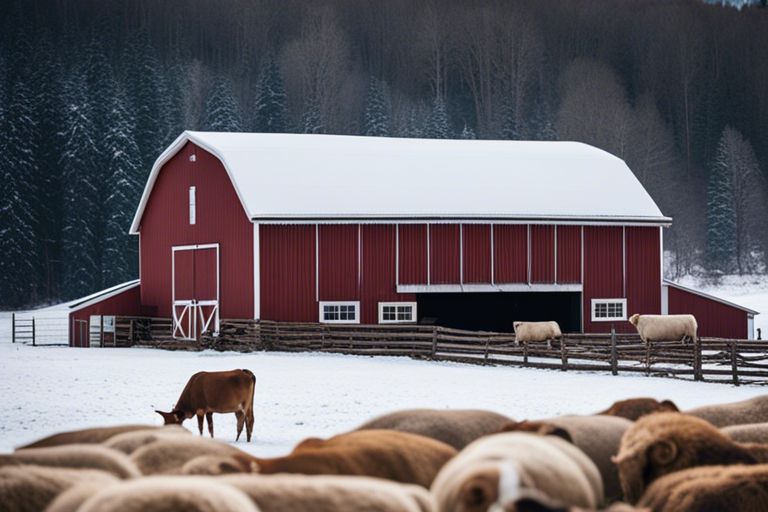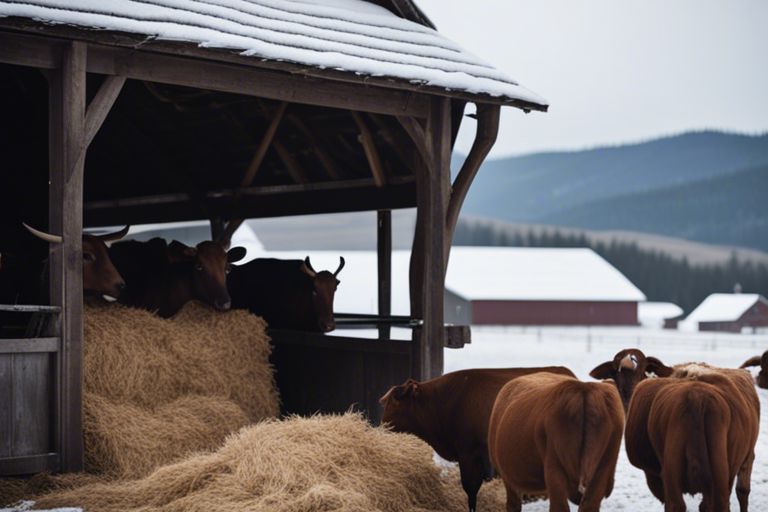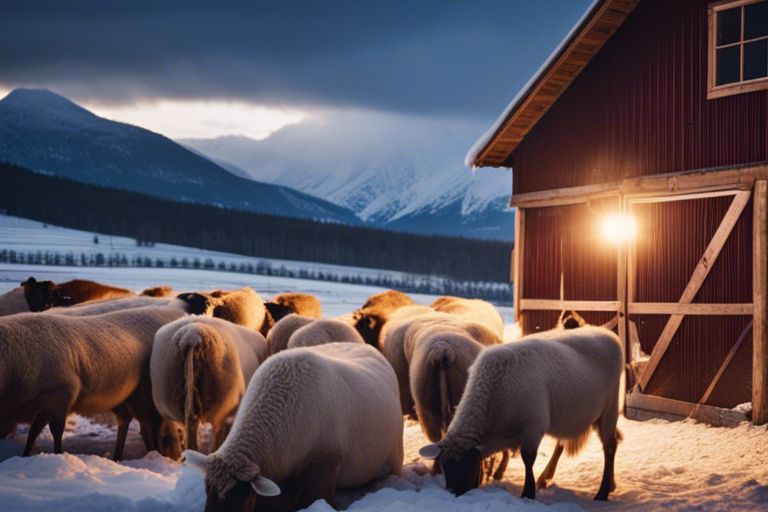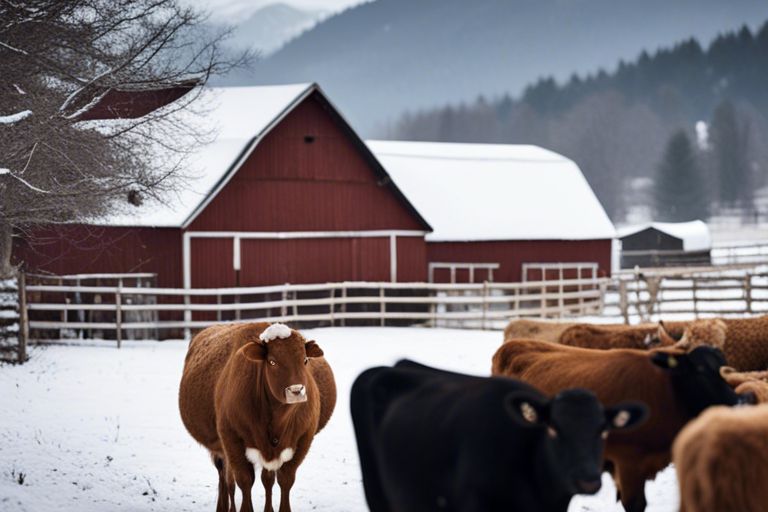Just as humans require extra care in the winter season, so do livestock animals. Properly caring for your livestock during the cold winter months is crucial to their health and well-being. In this guide, we will discuss important tips and practices to ensure your animals stay safe, healthy, and comfortable during the winter season. From providing adequate shelter and nutrition to preventing frostbite and dehydration, we will cover everything you need to know to keep your livestock thriving in winter conditions.

Preparing for the Cold: Winter Readiness Checklist
Insulating Livestock Shelters
While preparing your livestock for the winter months, it is crucial to insulate their shelters properly. This will help retain warmth and provide a comfortable environment for your animals. Make sure to seal any drafts, add extra bedding for insulation, and consider using heat lamps or heaters if necessary. By taking these steps, you can help prevent cold stress and keep your livestock healthy during the winter.
Winter Feeding and Watering Guidelines
You should pay extra attention to your livestock’s feeding and watering needs during the winter months. Ensure they have a consistent supply of high-quality feed to help them maintain their body temperature and energy levels. Additionally, make sure they have access to fresh, unfrozen water at all times. Consider investing in heated water buckets or installing a water heater to prevent water from freezing. Proper nutrition and hydration are important for keeping your livestock healthy and comfortable in the cold weather.
Winter can be a challenging time for livestock owners, but with proper preparation and care, you can ensure the well-being of your animals throughout the season. By following these winter feeding and watering guidelines, you can help your livestock stay healthy, warm, and thriving despite the cold temperatures.

Factors Affecting Livestock Health in Winter
Now, as winter approaches, it’s imperative for livestock owners to be mindful of several factors that can impact the health and well-being of their animals during the colder months. By understanding and addressing these considerations, you can help ensure that your livestock stay healthy and comfortable throughout the winter season. Below are some key factors to keep in mind:
Climate and Environmental Considerations
The climate and environmental conditions during winter can have a significant impact on the health of your livestock. Cold temperatures, wind chill, precipitation, and humidity levels can all affect how your animals regulate their body temperature and overall well-being. Providing adequate shelter, bedding, and access to fresh water is crucial in helping your livestock stay warm and healthy during the winter months.
Breed-Specific Winter Care Needs
Livestock breeds vary in their ability to withstand cold weather, with some breeds being more suited to winter conditions than others. It’s important to be aware of the specific care needs of your breed of livestock during the winter. Some breeds may require additional shelter, insulation, or feeding to help them maintain their body condition and health during the colder months.
Environmental factors such as hair coat thickness, body fat reserves, and metabolic rate can also play a role in how well different breeds of livestock cope with winter conditions. By understanding these breed-specific needs, you can tailor your care practices to ensure that your animals stay healthy and comfortable throughout the winter.
Daily Care Tips for Maintaining Livestock Health
Once again, it is crucial to ensure that your livestock is well taken care of during the winter months. Daily care routine plays a vital role in maintaining the health and well-being of your animals. Here are some tips to help you keep your livestock healthy and happy during the cold season:
- Provide fresh, clean water daily
- Ensure adequate shelter from harsh weather conditions
- Feed high-quality, energy-rich diet to help animals stay warm
- Monitor for signs of illness or cold stress regularly
Monitoring for Cold Stress and Illness
Some signs of cold stress in livestock include shivering, lethargy, reduced feed intake, and huddling together for warmth. It is important to regularly check your animals for these signs and take necessary measures to prevent health issues. Consult with a veterinarian if you notice any concerning symptoms.
Exercise and Grooming in Cold Weather
There’s no denying the importance of exercise and grooming even in cold weather. While it may be tempting to limit outdoor activities during winter, it is crucial to ensure that your livestock gets regular exercise to maintain their physical health and prevent obesity. Regular grooming helps to improve blood circulation and keep their coat in good condition.
The key is to strike a balance between providing adequate exercise and grooming while ensuring your animals are not exposed to extreme weather conditions for extended periods. Adjust your routine based on the severity of the weather and the individual needs of your livestock.

Emergency Preparedness and Winter Health Interventions
Recognizing and Reacting to Frostbite and Hypothermia
Emergency preparedness is crucial when it comes to livestock welfare in winter. Recognizing the signs of frostbite and hypothermia in animals is necessary for prompt intervention. Symptoms of frostbite include pale skin, cold extremities, and swelling, while hypothermia may manifest as shivering, lethargy, and decreased body temperature. Immediate action such as moving the animal to a warm, dry area and providing blankets or heat lamps can help prevent further complications.
Developing a Livestock Winter Emergency Plan
Developing a comprehensive livestock winter emergency plan is vital to ensure the well-being of your animals during harsh weather conditions. This plan should include provisions for shelter, access to unfrozen water sources, and a stockpile of hay or feed. It is also crucial to have emergency contact numbers for veterinarians and animal rescue organizations readily available in case of severe weather emergencies.
Another important aspect of a livestock winter emergency plan is regular inspection of barns and shelters for any signs of damage or potential hazards. Ensuring that heating systems are functional and that there are no drafts or leaks will help maintain a safe and comfortable environment for the animals throughout the winter months.
Summing up
Drawing together all the elements of properly caring for livestock in winter, it is vital to prioritize their warmth, nutrition, hydration, and shelter. By ensuring that their living conditions are comfortable and their needs are met, farmers can minimize the risks associated with cold weather and keep their animals healthy throughout the winter season. Regular monitoring and adjustments to their care routine will also play a crucial role in maintaining their well-being during the coldest months of the year.
FAQ
Q: Why is it important to properly care for livestock in winter?
A: Proper care for livestock in winter is important to ensure their health and well-being during harsh weather conditions. Neglecting their needs can lead to illness, injury, or even death.
Q: What are some key considerations when caring for livestock in winter?
A: Key considerations include providing adequate shelter, bedding, water, and nutrition to help livestock stay warm and healthy in cold temperatures.
Q: How should I prepare shelters for livestock in winter?
A: Shelters should be insulated, draft-free, and well-ventilated to protect livestock from extreme cold. Adding extra bedding such as straw or hay can also help provide additional warmth.
Q: What kind of nutrition do livestock need in winter?
A: Livestock need a balanced diet rich in energy to help them maintain body heat in winter. High-quality forage, hay, and supplemental grains can provide the extra calories they need during colder months.
Q: How often should I check on livestock in winter?
A: Livestock should be checked on multiple times a day in winter to ensure they have access to water, food, and a comfortable shelter. Monitoring their health and behavior is crucial for early detection of any issues.
Q: Are there any special considerations for specific types of livestock in winter?
A: Yes, different types of livestock may have specific needs in winter. For example, sheep and goats may require extra protection from wet conditions, while horses may need blankets to stay warm.
Q: What are some common winter health concerns for livestock?
A: Common winter health concerns for livestock include frostbite, hypothermia, dehydration, and respiratory infections. Understanding these risks and taking preventive measures is key to keeping livestock healthy in winter.











